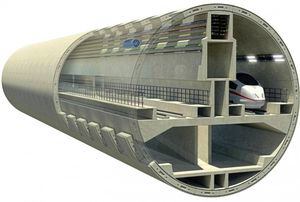Plans for inter-island tunnel in spotlight at IoD event
BUSINESS leaders were today ready to hear about the latest developments surrounding proposals to create a new rail link between Guernsey and Jersey – with a future connection to France.

Stephen Whitham, head of department tunnels at international engineering firm Ramboll, was set to present an engineer’s perspective on the project at the Guernsey Institute of Directors’ January breakfast event – including the credibility of the link, the predicted costs and how Guernsey could practically turn vision into reality.
Ahead of the event, Mr Whitham spoke to the Guernsey Press about the project that would be developed in two phases. Phase one (national) would connect St Peter Port, Jersey Airport and St Helier. Phase two would be an onward international connection to France and mainland Europe.
‘Why discuss a fixed link (connection) between Guernsey and Jersey, and also, why consider a connection to France?
‘Are we credible, misguided or is there something more driving this?’ said Mr Whitham.
‘For me at least, the answer to the project lies in finding a sustainable future for the islands. That is to say that based on forecasting and modelling, and within a generation, the ageing population of the islands will not be able to sustain themselves.
‘A permanent inter-island connection and a link to mainland France has been thought of to provide some of the solutions needed to meet this challenge.’

The merits of the project have been evaluated since last summer, with the focus being on a rail link between Jersey and Guernsey via a bored tunnel – although alternatives still need further assessment given the early stages of development.
Mr Whitham went on: ‘The revised version of the project omits the formation of an artificial island between Jersey and Guernsey, however, the rail aspect has remained. The intent of a rail, rather than a vehicle link, is also in recognition of the longevity of the scheme where we forecast environmentally sustainable modes of travel will become preferential to sea or air travel.’
Stressing the technical aspects were feasible, based on research, he added: ‘At this early stage, we have narrowed the mode of transport to a rail link but both a bridge or tunnel seem potentially viable.’
Asked about the price tag, the engineering expert said: ‘As many factors are still under consideration and need further investigation, it is very early to give any definitive answer to the question. However, being as transparent as possible the project described (national connection) has a construction estimate of approximately £2.6bn.
‘Sources of income and the balance of finance is in discussion as it is tied to the project scope and benefits to stakeholder groups which are still open topics at this stage.’
The IoD seminar is also set to hear from local businessman Martyn Dorey, a former president of the Guernsey Chamber of Commerce, who has been a driving force in the bid to connect Guernsey, Jersey and France via a fixed link.
‘Investment in infrastructure can have a profound and lasting effect on economic growth,’ he said.
‘This is not a new phenomenon. Europe continues to benefit from the revolutionary strategic vision the Romans had in investing in roads and transport routes almost 2,000 years ago.
‘I look forward to discussing the economic benefits an infrastructure project could have for Guernsey, including GDP, tax and population.’





